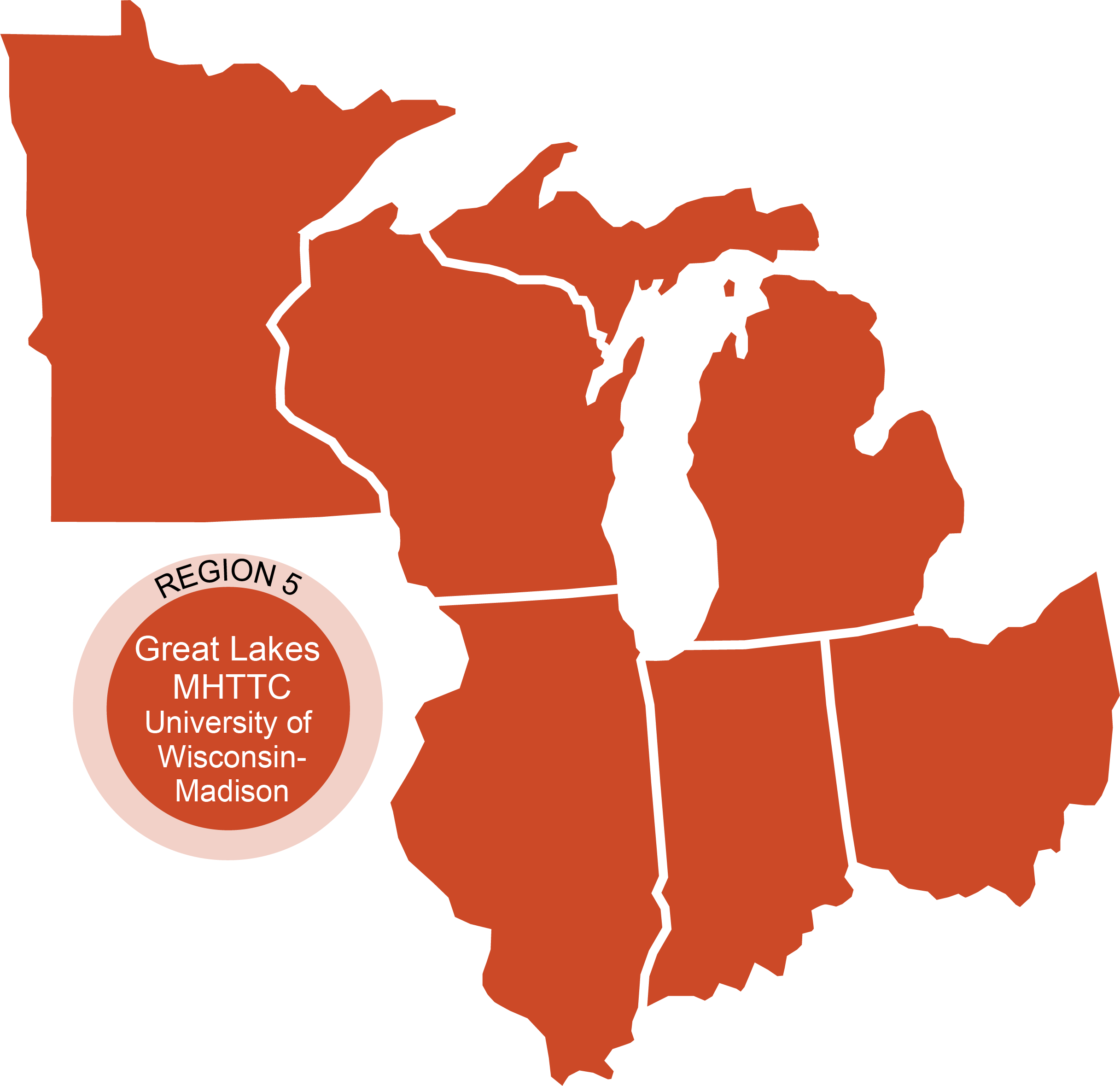Home > MIC Stories: Youth/Teen Mental Health First Aid Training Initiative

MIC Stories (MHTTCs Implementing Change) feature technical assistance projects that had a significant impact on practice.
Addressing the mental health needs of individuals is critically important. Half of all mental illnesses begin by age 14 and three-quarters by mid-20s. Left unaddressed, mental health issues can lead to serious consequences for a young person’s well-being, including increased risk of dropping out of school or experiencing homelessness. Tragically, suicide is the second leading cause of death for 15 to 24 year-olds.
Through support and partnership with the Illinois Association for Behavioral Health (IABH), Great Lakes MHTTC committed to conducting a Youth Mental Health First Aid (YMHFA) Training Initiative in 2019 to provide training to adults who work with youth on how to identify, understand and respond to signs of mental illnesses and substance use disorders. IABH trained staff to become YMHFA trainers and held nine trainings and trained over 200 adults to become Youth Mental Health First Aiders. As we were in the middle of our first year of this initiative, a new pilot program for Teen Mental Health First Aid (tMHFA) was coming into fruition.
Note: tMHFA is an evidence-based training that was brought to the United States in partnership with Lady Gaga’s Born This Way Foundation that teaches high school students in the 10th, 11th and 12th grades how to identify, understand and help their friends with mental health and substance use challenges and how to get the help of an adult quickly. The team at IABH was selected as one of eight pilot sites in 2019 and the only site in Illinois to become instructors and implement the program, and thus expanded Great Lakes MHTTC's YMHFA efforts drastically.
IABH instructors implemented the training at the Great Lakes MHTTC 2019 Cebrin Goodman Teen Institute (CGTI) conference in July for PALS (Peers with Advanced Leadership Skills - 2nd and 3rd year participants) and partnered with Amos Alonzo Stagg High School to train their Sophomore class in Spring of 2019. Stagg High School requested that the Great Lakes MHTTC team return in Fall 2019 and Spring 2020 to train the next sophomore class; however, due to the COVID-19 pandemic, the Great Lakes MHTTC team was only able to train half of their Sophomore class in Fall 2019 and could not complete the program in Spring 2020 due to school closure.

One requirement before the tMHFA training can begin for the selected students is that 10% of the adults working with the students need to complete the YMHFA Training. This requirement is vital to the success of tMHFA as one main component learned in the 5-step action plan is to get connected with an adult. Having adults complete the youth MHFA first ensures a pool of adults who are equipped to assist students when they need help.
The tMHFA training can be implemented in two different formats: three 90-minute sessions or six 45-minute sessions. The Great Lakes MHTTC team utilized both approaches. When the PALS at CGTI were trained, the sessions were implemented using the three 90-minute sessions and completed within one day at the summer conference. Conversely, when the Great Lakes MHTTC team trained the students at Stagg High School, they utilized the six 45-minute session approach as this best fit their school bell schedule, and the training was completed within a month.
Obtaining full community support: The Great Lakes MHTTC was very lucky to work with a Superintendent who was in full support of the initiative but there are always many levels of individuals to be involved with a project at this scale. The challenge faced was not that teachers didn’t support the YMHFA training program or the tMHFA pilot, it was that key information was being lost in translation. Once the Great Lakes MHTTC team found out the best mode to communicate widespread information, they were full speed ahead.
Implementation with the students: Being involved in a pilot program comes with many learning experiences and the students who went through this training provided incredible feedback not only on the content, but how the information is delivered. Stagg High School presented the Great Lakes MHTTC team with the ability to have a diverse student body, with each child having a different social location, and each student teaching the team something new. Learning to universalize situations and examples was key to maintaining full student attention.
Students completed a survey before and after the training. The test assesses:
Specific outcomes have been different for each site, but there are some key components that students have learned from completing this training. A preview of some of the feedback compiled is below:
Currently this training can only be implemented in person, and the Great Lakes MHTTC team will continue to follow CDC guidelines to determine when it is safe to begin training students again.
Our plans when safe to resume this initiative:

The Great Lakes MHTTC, funded by the Substance Abuse and Mental Health Services Administration, is located in Madison, WI and is housed at the University of Wisconsin-Madison Center for Health Enhancement Systems Studies. The Great Lakes MHTTC provides high-value training and technical assistance targeted to local needs in IL, IN, MI, MN, OH, and WI. The goals of the Great Lakes MHTTC are to accelerate the adoption and implementation of evidence-based practices, heighten the awareness, knowledge, and skills of the workforce, develop strategies for delivering culturally-informed care with diverse practitioners, researchers, policy makers, family members, and consumers of mental health services, and increase access to publicly available, free of charge, training and technical assistance to the mental health field.